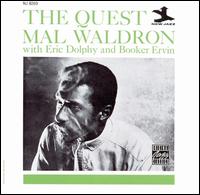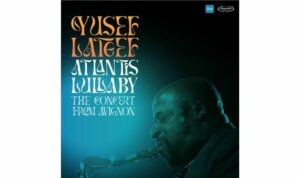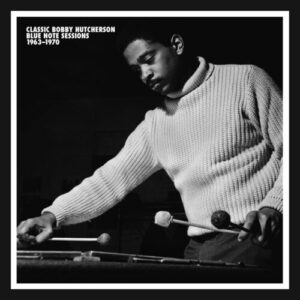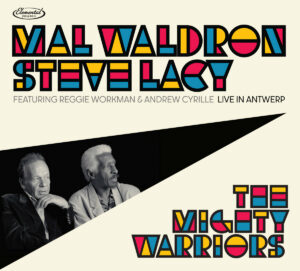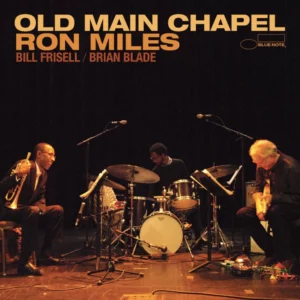Not dark yet, but it’s getting there. I’ve been hearing that lament for years, even before This Guy made it into a song. So, who’s in the mood in these stormy, anxious times for new things to listen to, much less old things, no matter how great or revelatory? I ‘ve always argued that near dark is the best time for music, especially my kind of music. As it happens, there’s been a surfeit of beautiful archival jazz circulating in recent months, evoking eras when Anything and Everything was possible. Most, if not all of them, are even available on vinyl and most are, or soon will be, downloadable. I’ve been diving deep into these recovered sounds for weeks now; I’m at that point where I’m once again living in the Now of whatever’s directly in front of me and not whatever’s going to happen in November, or even October, with or without robots seizing autonomy over the culture.
I’m not suggesting they’ll do the exact same for you. But even if you knew nothing at all about the musicians I’m about to gab about, you can agree it’s understating matters to say there are worse things to do in the summer of 2024 than grab hold of what was hip and cutting-edge in 1959, 1966, or even 2011, when, If you can think that far back, you may remember ever-so-faint signs of hope that you could drag out of the dirtiest, most sordid media pit.
Never mind where. Take my word for it. And, while you’re at it, on these, too:
Yusef Lateef, Atlantis Lullaby: The Concert From Avignon (Elemental) – I’m guessing from the many times in the last year or two that I’ve heard tracks from his 1961 LP Eastern Sounds in jazz radio rotation that Yusef Lateef is enjoying a more-than-modest revival in a jazz world that respected his avid, informed eclecticism, but somewhat shortchanged him as a versatile, lyrical player. While he may not have changed the known universe as decisively as contemporaries like Rollins and Coltrane did on their respective tenors, Lateef could wield his reeds with as much force, conviction and relentless invention as anyone in his era. And this live set from the Cloitre des Célestins in July 1972 (unearthed by the indefatigable Zev Feldman) offers a retroactively startling display of his range as a soloist and strengths as a leader. Along with pianist Kenny Barron, bassist Bob Cunningham, and drummer Albert “Tootie” Heath, Lateef knew how to give the people their money’s worth, and then some. Want something straight-ahead? Seventeen minutes and change of the rousing “Yusef’s Mood” will take you for a heady spin around Swingsville. Lateef brings out his flute for both Roy Brooks’ “Eboness” and in tandem with Barron on the latter’s ruminative “A Flower.” Everybody on this date was locked in with the leader contributing impassioned variations on “I’m Getting Sentimental Over You,” Cunningham flexing his own resourcefulness in his solo on “Eboness,” and Heath propelling the apparatus with unflagging energy and invention. But maybe it’s because Barron has now become the acknowledged jazz piano master of the present day that one pays added attention throughout to the whirling dynamics of his comps and solos. In any event, the Yusef Lateef revival can only acquire added momentum from this effervescent gig. It’s enough fun to make one wonder whether there are other live sets of Lateef’s flying under the radar that could benefit from similarly conscientious exposure.
Bobby Hutcherson, Classic Bobby Hutcherson Blue Note Sessions 1963-1970 (Mosaic)— I could scarcely put it better than Richard Cook and Brian Morton in The Penguin Guide to Jazz Recordings: “If Hutcherson were a saxophonist, trumpeter, or pianist, he would be regarded as a major figure in jazz, but the vibes still have a slightly eccentric standing, a prejudice which has kept Bobby on the margins.” He’s still hugging those margins eight years after his death at 75 — even though he expanded the expressive possibilities of his instrument as broadly and definitively as any post-bop innovator. Hutcherson could make the vibraphone do things no other instrument could, whether applying harmonic latticework beneath and around horn sections or pressing forth his own intricate and arresting variations. Having this seven-disc compilation of Hutcherson’s ground-breaking albums from the 1960s should once and for all make the case for his lasting significance. The first of these sessions took place a month after JFK’s assassination and the last is dated almost a year after men first walked on the moon. The gratification of having all these recordings gathered in one place (after years of wandering in and out of print) is matched in degree by the sweeping narrative arc of Hutcherson’s growth in this fertile period. The first Blue Note album under his own name, 1963’s The Kicker, comes across more as a showcase for tenor poet Joe Henderson, though Hutcherson’s own ability to weave compelling stories asserts itself as strikingly, if not yet as prominently. In similar fashion, Hutcherson’s second LP, 1965’s Dialogue, is as much, if not more of a triumph for pianist-composer Andrew Hill, though the latter’s state-of-the-art blend of eccentric rhythms and montage-like themes can now be seen as table-setters for the idiosyncratic sound mosaics Hutcherson would forge more resolutely in the years to come. My own favorite album from this period, 1966’s Happenings is given its own disc in this set and the session’s high point, the spellbinding “Bouquet,” remains an immersive wonder, perfectly aligned with the shapeshifting “Aquarian Moon” along with Hutcherson’s version of Herbie Hancock “Maiden Voyage,” which matches and nearly one-ups Hancock’s 1964 original. Hancock’s on that session and on 1967’s “Oblique,” noteworthy for including the only recorded version of Hancock’s “Theme from ‘Blow Up’” that wasn’t in the score for Michelangelo Antonioni’s mondo-mod movie. Indeed, the whole boxed set is a sixties time capsule with the edgy modal experimentalism of mid-decade giving way to funk-rock fusion insinuating itself into 1968’s Total Eclipse and Spiral, culminating with the 1970 San Francisco sessions featuring Harold Land and Joe Chambers. In many ways, this was the Mosaic set I’d been waiting for since Michael Cuscuna, longtime friend and producer of Hutcherson, helped create the label more than a half-century ago and I used to noodge Michael about it whenever the opportunity arose. This was likely the last such project produced for Mosaic by Michael, who died this past April at 75 and while I still think his loss to archival American music is irredeemable, his legacy is vast and durable, and this boxed set is now a very big part of it.
Mal Waldron, The Quest (OJC)
Mal Waldron & Steve Lacy, The Mighty Warriors (Elemental)
The Quest (1962), newly re-released in a special vinyl edition, sounds like a score for one of those slate-gray crime thrillers from the late 1950s or early 1960s set in an uptown Manhattan where every male character sports stingy-brim fedoras, the women are enigmatic and volatile, and the sun is an unsubstantiated rumor obscured by tobacco smoke. The album itself has existed partly in myth, having once in its sixty-plus years in existence. been put out with Eric Dolphy’s name out front (as it were) instead of Waldron’s. (Likely, it’s because “Fire Waltz” is forever associated with Dolphy, even though it’s so plainly a Waldron composition in its wit, cunning, and melodic ingenuity.) As it happens, Waldron, a cult legend’s cult legend on the New York jazz club circuit where he was best known as Billie Holiday’s longtime accompanist, is credited as composer on the score for the cinema verité classic The Cool World, which was released in 1963, the same year Waldron suffered an all-but-catastrophic mental breakdown following a heroin overdose. He slowly recovered, relocated to Europe, and, as with generations of jazz musicians preceding him, found greater acclaim, bigger gigs – and even, occasionally, more movie work – overseas. As Waldron’s understated virtuosity and idiosyncratic command of time and space made him an even more influential force among progressive jazz pianists worldwide, he and soprano saxophonist Steve Lacy, another expatriate from the New York scene, forged a sympathetic meeting of minds that often made for high drama and incisive conversation in recitals throughout the 1980s and 1990s. Mighty Warriors, a two-disc discovery brought to the surface by the unstoppable Zev Feldman, catches their colloquy in a 1995 recital in Antwerp with drummer Andrew Cyrille and bassist Reggie Workman. The first disc is relatively poised with both leaders exchanging their own compositions (Waldron’s “What It Is,” Lacy’s “Longing”) and making their customary salute to their shared patron saint Thelonious Monk (“Epistrophy,” “Monk’s Dream”). High adventure beckons on Disc 2 with Workman’s “Variation of III” goading Lacy and Waldron towards ever-spiraling riff extensions and Waldron’s “Snake Out” giving way to his bold-and-brave “Variations on a Theme by Cecil Taylor,” which summons feverish tempests of invention from Cyrille. Someday, somehow, such performances will become as acknowledged as classics by the world-at-large as they are by the generations of artists, not just in music, who have been inspired by their reach for starlight and truth.
Ron Miles, Bill Frisell, & Brian Blade, Old Man Chapel (Blue Note)— Every premature loss leaves one feeling cheated and trumpeter Ron Miles’ passage in 2022, at age 58, from a rare blood disease felt especially cruel to those of us who saw him on the threshold of greater, wider recognition. Among jazz horns living and dead, Miles (and, yes, that surname does carry some karmic convergence and psychic weight) was a plaintive folk balladeer, as cozy with blues shouts like “There Aint No Sweet Man That’s Worth the Salt of My Tears” (part of the Paul Whiteman band’s playbook) as he was with a classically designed rag like “Guest of Honor” (dedicated to his son Honor) or an anthem as resolute and haunting as “I Will Be Free,” which dares you to come up with lyrics as eloquent and elemental as Miles’ deceptively simple melody. These and more were part of a 2011 live date by Miles’ then-emergent trio with guitarist Bill Frisell and drummer Brian Blade at the Old Main Chapel in Boulder, Colorado, in the state where Miles had made his home. The concert is a pleasant reminder of how seamlessly this trio operated as a synchronous unit with Frisell’s own harmonic impulses filtering through each piece with impeccable acumen and Blade’s zeal for power runs contained and controlled with both precision and discernment. You wish this trio could have done more. You wish for many things
